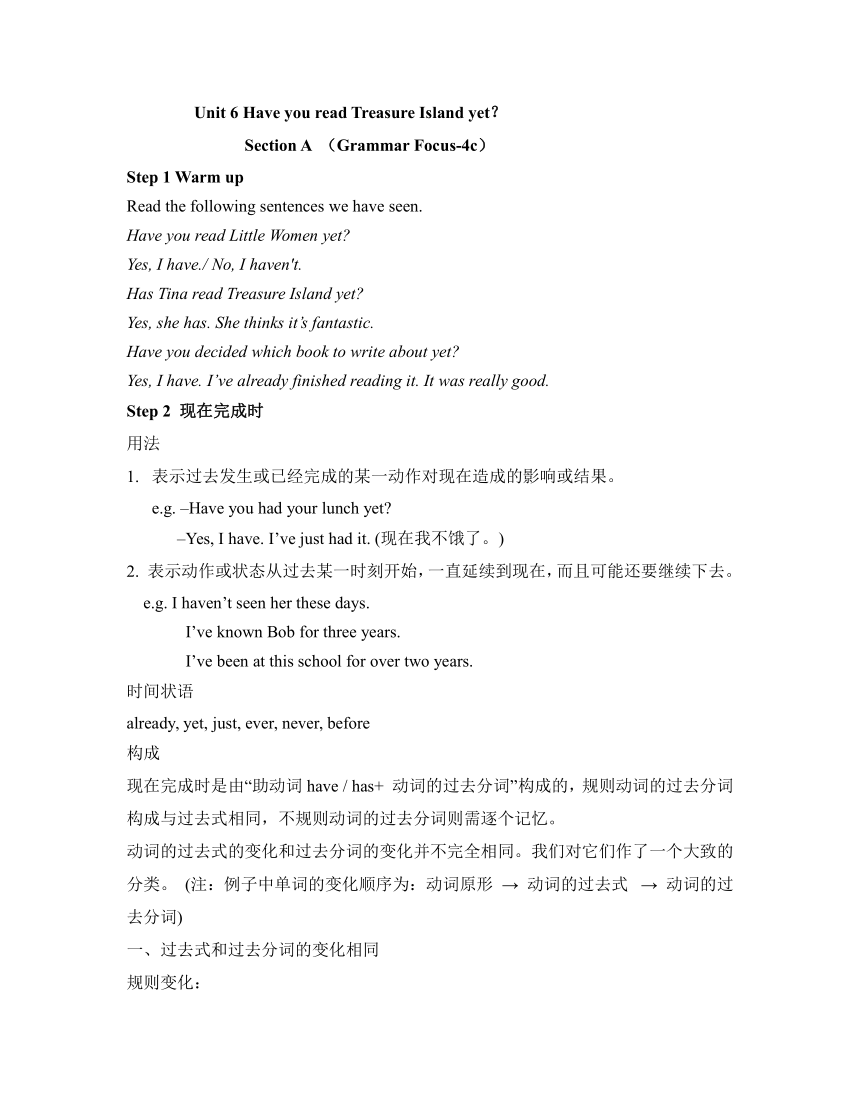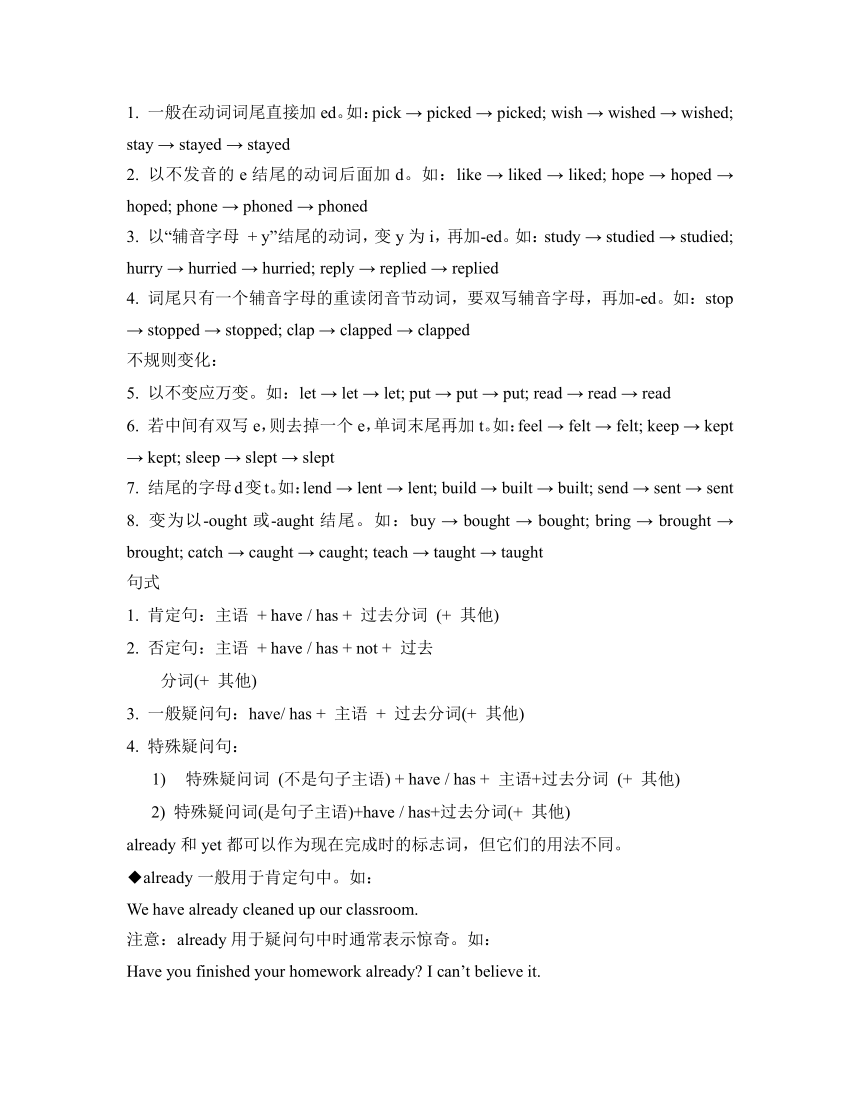Unit 6 Have you read Treasure Island yet-Section A(Grammar Focus-4c)教案(练习无答案)
文档属性
| 名称 | Unit 6 Have you read Treasure Island yet-Section A(Grammar Focus-4c)教案(练习无答案) |  | |
| 格式 | doc | ||
| 文件大小 | 23.0KB | ||
| 资源类型 | 教案 | ||
| 版本资源 | 鲁教版 | ||
| 科目 | 英语 | ||
| 更新时间 | 2022-10-26 11:45:54 | ||
图片预览


文档简介
Unit 6 Have you read Treasure Island yet?
Section A (Grammar Focus-4c)
Step 1 Warm up
Read the following sentences we have seen.
Have you read Little Women yet
Yes, I have./ No, I haven't.
Has Tina read Treasure Island yet
Yes, she has. She thinks it’s fantastic.
Have you decided which book to write about yet
Yes, I have. I’ve already finished reading it. It was really good.
Step 2 现在完成时
用法
1. 表示过去发生或已经完成的某一动作对现在造成的影响或结果。
e.g. –Have you had your lunch yet
–Yes, I have. I’ve just had it. (现在我不饿了。)
2. 表示动作或状态从过去某一时刻开始,一直延续到现在,而且可能还要继续下去。
e.g. I haven’t seen her these days.
I’ve known Bob for three years.
I’ve been at this school for over two years.
时间状语
already, yet, just, ever, never, before
构成
现在完成时是由“助动词have / has+ 动词的过去分词”构成的,规则动词的过去分词构成与过去式相同,不规则动词的过去分词则需逐个记忆。
动词的过去式的变化和过去分词的变化并不完全相同。我们对它们作了一个大致的分类。 (注:例子中单词的变化顺序为:动词原形 → 动词的过去式 → 动词的过去分词)
一、过去式和过去分词的变化相同
规则变化:
1. 一般在动词词尾直接加ed。如:pick → picked → picked; wish → wished → wished; stay → stayed → stayed
2. 以不发音的e结尾的动词后面加d。如:like → liked → liked; hope → hoped → hoped; phone → phoned → phoned
3. 以“辅音字母 + y”结尾的动词,变y为i,再加-ed。如:study → studied → studied; hurry → hurried → hurried; reply → replied → replied
4. 词尾只有一个辅音字母的重读闭音节动词,要双写辅音字母,再加-ed。如:stop → stopped → stopped; clap → clapped → clapped
不规则变化:
5. 以不变应万变。如:let → let → let; put → put → put; read → read → read
6. 若中间有双写e,则去掉一个e,单词末尾再加t。如:feel → felt → felt; keep → kept → kept; sleep → slept → slept
7. 结尾的字母d变t。如:lend → lent → lent; build → built → built; send → sent → sent
8. 变为以-ought或-aught结尾。如:buy → bought → bought; bring → brought → brought; catch → caught → caught; teach → taught → taught
句式
1. 肯定句:主语 + have / has + 过去分词 (+ 其他)
2. 否定句:主语 + have / has + not + 过去
分词(+ 其他)
3. 一般疑问句:have/ has + 主语 + 过去分词(+ 其他)
4. 特殊疑问句:
1) 特殊疑问词 (不是句子主语) + have / has + 主语+过去分词 (+ 其他)
2) 特殊疑问词(是句子主语)+have / has+过去分词(+ 其他)
already和yet都可以作为现在完成时的标志词,但它们的用法不同。
◆already一般用于肯定句中。如:
We have already cleaned up our classroom.
注意:already用于疑问句中时通常表示惊奇。如:
Have you finished your homework already I can’t believe it.
◆yet一般用于疑问句和否定句中。如:
Have you seen her yet
The bus hasn’t come yet.
活学活用
Write the forms of the past tense and past participle:
drink ______ ______
see ____ ____
find ______ _____
leave ____ ____
tell ____ ____
—Why is Mr. Yang still in the teachers’
office
—Maybe he ________ his work yet.
A. doesn’t finish B. hasn’t finished
C. haven’t finished
Step 3 Exercises
1. Finish 4a and check the answers.
Keys: I have just drunk some tea.
Have you found it
He has already left.
did he leave
She has already seen the film
haven’t told them yet
2. Finish 4b and check the answers.
Keys: loves, has read, will be, finished, will write, hasn’t read
3. Finish 4c and check the answers.
Make conversations and complete the chart. (Follow the conversation on page 60)
Step 4 练习
( )—Do you know the movie Lost in Thailand
—Yes. I ______ it twice. It’s funny.
A. saw B. see C. have seen D. will see
( ) —Lunch
—No, thanks. I__________.
A. will eat B. am eating C. have eaten
( )—Where is Tom We can’t find him anywhere.
— Perhaps he _____ home.
A. has come B. is going
C. went D. was going
Keys: CCA
Section A (Grammar Focus-4c)
Step 1 Warm up
Read the following sentences we have seen.
Have you read Little Women yet
Yes, I have./ No, I haven't.
Has Tina read Treasure Island yet
Yes, she has. She thinks it’s fantastic.
Have you decided which book to write about yet
Yes, I have. I’ve already finished reading it. It was really good.
Step 2 现在完成时
用法
1. 表示过去发生或已经完成的某一动作对现在造成的影响或结果。
e.g. –Have you had your lunch yet
–Yes, I have. I’ve just had it. (现在我不饿了。)
2. 表示动作或状态从过去某一时刻开始,一直延续到现在,而且可能还要继续下去。
e.g. I haven’t seen her these days.
I’ve known Bob for three years.
I’ve been at this school for over two years.
时间状语
already, yet, just, ever, never, before
构成
现在完成时是由“助动词have / has+ 动词的过去分词”构成的,规则动词的过去分词构成与过去式相同,不规则动词的过去分词则需逐个记忆。
动词的过去式的变化和过去分词的变化并不完全相同。我们对它们作了一个大致的分类。 (注:例子中单词的变化顺序为:动词原形 → 动词的过去式 → 动词的过去分词)
一、过去式和过去分词的变化相同
规则变化:
1. 一般在动词词尾直接加ed。如:pick → picked → picked; wish → wished → wished; stay → stayed → stayed
2. 以不发音的e结尾的动词后面加d。如:like → liked → liked; hope → hoped → hoped; phone → phoned → phoned
3. 以“辅音字母 + y”结尾的动词,变y为i,再加-ed。如:study → studied → studied; hurry → hurried → hurried; reply → replied → replied
4. 词尾只有一个辅音字母的重读闭音节动词,要双写辅音字母,再加-ed。如:stop → stopped → stopped; clap → clapped → clapped
不规则变化:
5. 以不变应万变。如:let → let → let; put → put → put; read → read → read
6. 若中间有双写e,则去掉一个e,单词末尾再加t。如:feel → felt → felt; keep → kept → kept; sleep → slept → slept
7. 结尾的字母d变t。如:lend → lent → lent; build → built → built; send → sent → sent
8. 变为以-ought或-aught结尾。如:buy → bought → bought; bring → brought → brought; catch → caught → caught; teach → taught → taught
句式
1. 肯定句:主语 + have / has + 过去分词 (+ 其他)
2. 否定句:主语 + have / has + not + 过去
分词(+ 其他)
3. 一般疑问句:have/ has + 主语 + 过去分词(+ 其他)
4. 特殊疑问句:
1) 特殊疑问词 (不是句子主语) + have / has + 主语+过去分词 (+ 其他)
2) 特殊疑问词(是句子主语)+have / has+过去分词(+ 其他)
already和yet都可以作为现在完成时的标志词,但它们的用法不同。
◆already一般用于肯定句中。如:
We have already cleaned up our classroom.
注意:already用于疑问句中时通常表示惊奇。如:
Have you finished your homework already I can’t believe it.
◆yet一般用于疑问句和否定句中。如:
Have you seen her yet
The bus hasn’t come yet.
活学活用
Write the forms of the past tense and past participle:
drink ______ ______
see ____ ____
find ______ _____
leave ____ ____
tell ____ ____
—Why is Mr. Yang still in the teachers’
office
—Maybe he ________ his work yet.
A. doesn’t finish B. hasn’t finished
C. haven’t finished
Step 3 Exercises
1. Finish 4a and check the answers.
Keys: I have just drunk some tea.
Have you found it
He has already left.
did he leave
She has already seen the film
haven’t told them yet
2. Finish 4b and check the answers.
Keys: loves, has read, will be, finished, will write, hasn’t read
3. Finish 4c and check the answers.
Make conversations and complete the chart. (Follow the conversation on page 60)
Step 4 练习
( )—Do you know the movie Lost in Thailand
—Yes. I ______ it twice. It’s funny.
A. saw B. see C. have seen D. will see
( ) —Lunch
—No, thanks. I__________.
A. will eat B. am eating C. have eaten
( )—Where is Tom We can’t find him anywhere.
— Perhaps he _____ home.
A. has come B. is going
C. went D. was going
Keys: CCA
同课章节目录
- Unit 1 Could you please clean your room?
- Section A
- Section B
- Unit 2 Why don't you talk to your parents?
- Section A
- Section B
- Unit 3 What were you doing when the rainstorm came
- Section A
- Section B
- Unit 4 An old man tried to move the mountains.
- Section A
- Section B
- Unit 5 What's the highest mountain in the world?
- Section A
- Section B
- Unit 6 Have you read Treasure Island yet?
- Section A
- Section B
- Unit 7 Have you ever been to a museum?
- Section A
- Section B
- Unit 8 I've had this bike for three years.
- Section A
- Section B
